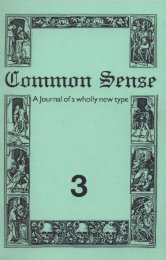i on thomas paine reviews: origins of crisis in ussr - Common Sense
i on thomas paine reviews: origins of crisis in ussr - Common Sense
i on thomas paine reviews: origins of crisis in ussr - Common Sense
Create successful ePaper yourself
Turn your PDF publications into a flip-book with our unique Google optimized e-Paper software.
Page 44 Comm<strong>on</strong> <strong>Sense</strong> - Issue 15<br />
and stra<strong>in</strong> to <strong>in</strong>tegrate class struggle <strong>in</strong>to their analysis. As Aglietta (1979, p. 67) sees it,<br />
class struggle is bey<strong>on</strong>d 'any law'. 'Capital' is not c<strong>on</strong>ceived as a social relati<strong>on</strong> <strong>in</strong> and<br />
through labour. Instead, 'capital' is seen as an entity which has its own logic, a logic<br />
which stands above class relati<strong>on</strong>s. Thus 'capital' is not class struggle because 'capital is<br />
the subject' (Jessop. 1991. p. 150). Class struggle is expelled from the analysis <strong>in</strong>s<strong>of</strong>ar as<br />
a proper understand<strong>in</strong>g <strong>of</strong> the c<strong>on</strong>crete, empirical, c<strong>on</strong>diti<strong>on</strong>s <strong>of</strong> class struggle needs to be<br />
based <strong>on</strong> a specificati<strong>on</strong> <strong>of</strong> the capitalist framework with<strong>in</strong> which class struggle obta<strong>in</strong>s<br />
and unfolds. C<strong>on</strong>sequently, structuralism emphasises the objective l<strong>in</strong>es <strong>of</strong> capitalist<br />
development. Structures are the <strong>on</strong>ly subject recognised by structuralism. Class struggle is<br />
aeated as a derivative <strong>of</strong> structural development. The dynamic <strong>of</strong> capitalist development is<br />
located <strong>in</strong> capital itself. C<strong>on</strong>tradicti<strong>on</strong> is seen as <strong>in</strong>ternal to capital, and capitalist devel-<br />
opment is a result <strong>of</strong> these c<strong>on</strong>tradicti<strong>on</strong>s.<br />
Unlike the theoretical suppressi<strong>on</strong> <strong>of</strong> class snuggle <strong>in</strong> structuralist approaches, aut<strong>on</strong>omist<br />
approaches place at their centre the self-activity <strong>of</strong> the work<strong>in</strong>g class. Class struggle is<br />
seen as primary. The emphasis is <strong>on</strong> labour's revoluti<strong>on</strong>ary power. Aut<strong>on</strong>omist approaches<br />
take as their start<strong>in</strong>g po<strong>in</strong>t the Marxian noti<strong>on</strong> that all social relati<strong>on</strong>s are essentially<br />
practical. In that emphasis lies an important difference from structure-centred approaches.<br />
The difficulty <strong>in</strong>herent <strong>in</strong> 'aut<strong>on</strong>omist' approaches is not that 'labour' is seen as be<strong>in</strong>g<br />
primary but that this noti<strong>on</strong> is not developed to its radical soluti<strong>on</strong>.<br />
Approaches predicated <strong>on</strong> the noti<strong>on</strong> <strong>of</strong> labour's self-activity tend to divide social existence<br />
<strong>in</strong>to dist<strong>in</strong>ct spheres <strong>of</strong>, <strong>on</strong> the <strong>on</strong>e hand, a mach<strong>in</strong>e-like logic <strong>of</strong> capital and the transcen-<br />
dental power <strong>of</strong> social practice, <strong>on</strong> the other. The emphasis <strong>on</strong> 'labour's self-activity' is<br />
founded <strong>on</strong> the '<strong>in</strong>versi<strong>on</strong>' <strong>of</strong> the class perspective'. This <strong>in</strong>versi<strong>on</strong> was advocated by Tr<strong>on</strong>ti<br />
who argued that rather than focus<strong>in</strong>g <strong>on</strong> capitalist development, the emphasis should be <strong>on</strong><br />
the struggle <strong>of</strong> the work<strong>in</strong>g class. As Tr<strong>on</strong>ti (196511979, p. 10) put it, capital uses<br />
exploitati<strong>on</strong> as a means <strong>of</strong> escap<strong>in</strong>g 'its de facto subord<strong>in</strong>ati<strong>on</strong> to the class <strong>of</strong> worker-<br />
producers'. Such a formulati<strong>on</strong> destroys the <strong>in</strong>sight that labour is a c<strong>on</strong>stitutive power.<br />
This is because capital is c<strong>on</strong>ceived as a subject <strong>in</strong> its own right: 'capital' is c<strong>on</strong>strued as<br />
some-th<strong>in</strong>g which not <strong>on</strong>ly reacts to the self-activity <strong>of</strong> labour but which also 'lives' by<br />
cajol<strong>in</strong>g labour's self-activity <strong>in</strong>to serv<strong>in</strong>g the capitalist cause. In other words, the<br />
<strong>in</strong>versi<strong>on</strong> <strong>of</strong> the class perspective is dependent up<strong>on</strong> two 'subjects': there is the self-<br />
activity <strong>of</strong> labour and capital's cajol<strong>in</strong>g power. The emphasis <strong>on</strong> '<strong>in</strong>versi<strong>on</strong>' does not raise<br />
the issue that 'labour' is the producer <strong>of</strong> perverted forms. Instead, labour tends to be seen as<br />
a power which exists external to its own perverted social world: the c<strong>on</strong>stitutive power <strong>of</strong><br />
labour stands external to its own perversi<strong>on</strong>. This perversi<strong>on</strong> is called 'capital'. Labour is<br />
seen as a self-determ<strong>in</strong><strong>in</strong>g power at the same time as which capital is a perverted power by<br />
virtue <strong>of</strong> its 'cajol<strong>in</strong>g capacity'. Thus Negri's (1992) emphasis <strong>on</strong> capital as a 'bewitch<strong>in</strong>g<br />
power'. The emphasis <strong>on</strong> the struggle comp<strong>on</strong>ent <strong>of</strong> the relati<strong>on</strong> between structure and<br />
struggle cannot overcome their theoretical separati<strong>on</strong>. The questi<strong>on</strong> why does human<br />
practice exist <strong>in</strong> the perverted form <strong>of</strong> capitalist dom<strong>in</strong>ati<strong>on</strong> is not raised. M<strong>in</strong>us an<br />
<strong>in</strong>terrogati<strong>on</strong> <strong>of</strong> the questi<strong>on</strong> <strong>of</strong> form, i.e. the specificati<strong>on</strong> <strong>of</strong> the social form <strong>in</strong> and<br />
through which the c<strong>on</strong>stitutive power <strong>of</strong> labour subsists <strong>in</strong> a c<strong>on</strong>tradictory way, noti<strong>on</strong>s <strong>of</strong><br />
labour's aut<strong>on</strong>omy from capital can amount <strong>on</strong>ly to a romantic <strong>in</strong>vocati<strong>on</strong> <strong>of</strong> the<br />
revoluti<strong>on</strong>ary subject's immediacy (see B<strong>on</strong>efeld/Gunn, 1991). Merely <strong>in</strong>vok<strong>in</strong>g labour's<br />
revoluti<strong>on</strong>ary immediacy tends to externalise structure from subject, so lead<strong>in</strong>g to a<br />
subjectivist c<strong>on</strong>cepti<strong>on</strong> which is the other side <strong>of</strong> determ<strong>in</strong>ism's co<strong>in</strong>. Unlike structuralist<br />
approaches, the emphasis is <strong>on</strong> class struggle, a struggle which rema<strong>in</strong>s, however, external<br />
On this '<strong>in</strong>versi<strong>on</strong>' see Cleaver 1992,1993.



